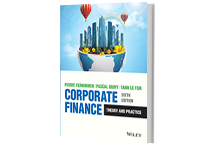Comment, question or quotation of the day
17-09-2025 : AXA borrows money at a lower rate than the French Republic
Around 70 major European groups, including Axa, have been borrowing at lower rates than the French government for several weeks now, due to the rise in the interest rate at which the French government borrows, which is itself caused by our collective inability to reduce the budget deficit to a level that ensures the sustainability of our nation's debt.
On Friday, the insurer's bond maturing in October 2030 yielded 2.74%, compared with 2.75% for the French government bond with a similar maturity. And yet, the government benefits from a liquidity premium that investors are willing to pay to reward the excellent liquidity of its bonds, this one has an outstanding amount of €59 billion. The liquidity of the AXA bond is much lower, with an outstanding amount of only €850 million, and buyers of these bonds tend to hold them until maturity (buy and hold). Without this liquidity premium enjoyed by the French government as a result of France Trésor's excellent management of the French debt market, the government would be borrowing at around 2.90% for a 5-year debt..
A comparison of this AXA bond with a similar maturity bond issued by Allianz shows that the borrowing rates of the two groups remain similar (2.72% for Allianz), even though AXA has a marginally lower rating (AA-, the same as France, compared with AA for Allianz and AAA for Germany). AXA is therefore not penalised by the deterioration in French government borrowing conditions. Nor is there any shift from sovereign debt to the debt of large French groups, which is hardly surprising given their much lower liquidity.
In OECD countries, it is very rare for groups to issue debt on better terms than their country of origin. This was observed briefly during the 2012 euro crisis, but concerned far fewer groups than today. This situation is of course unflattering, as it is generally observed in emerging countries, where government finances can be chaotic.
For the time being, this independence of large French groups from their government's debt is fortunate. Medium-sized groups also appear to be unaffected. For example, the yield on SEB's 2030 bond fell by 10 basis points this summer, as did that of AXA and Allianz, while the yield on 5-year OATs rose by the same amount.
Variable-rate bank loans indexed to €STR or Euribor should not be affected, as long as the short-term financing costs of French banks remain unaffected.
This will be less the case for individuals with future mortgage loans, whose interest rates are more or less indexed to long-term government bonds rates. Meilleurtaux has announced an average increase of 10 to 15 basis points in September for mortgage loans.
10-09-2025 : Sabadell: we are never better than when under pressure
The Catalan bank presented its strategic plan a few days ago to help it escape the clutches of BBVA, which launched a hostile takeover bid more than 14 months ago. As things stand, this bid is unlikely to succeed, with the offer price 13% below Sabadell's share price.
To convince its shareholders not to tender their shares to BBVA's offer, Sabadell has promised to return all equity generated by its results in excess of 13% of its weighted average assets (CET1 ratio) through dividends (for 60% of the results) or share buybacks for the remainder.
This is at the heart of the capital allocation process.
Sabadell's management and shareholders consider themselves comfortable with a financial structure in which their bank's risk-weighted assets are financed with 87% debt and 13% equity (compared with a prudential minimum requirement of 9.4%). Keeping equity in excess of this 13% inevitably means investing it in risk-free monetary assets (which are not included in the CET1 ratio calculation), as it cannot be used to grant additional loans to existing or new customers (which would eliminate this excess equity).
Of course, it would be preferable for Sabadell to use its equity above the 13% ratio to grant new loans. But trees do not grow to the sky, and in a mature sector such as universal banking in Europe, there are physical limits to the expansion of a loan portfolio, unless one is willing to accept bad risks. It is therefore preferable to return this new equity, generated by earnings, to Sabadell's shareholders via dividends or share buybacks, rather than using it to destroy value, either through losses on defaulted loans or through investments that are certainly risk-free but offer a much lower rate of return than that demanded by shareholders.
It is up to shareholders to reinvest this equity capital, which Sabadell does not need, in companies that do need equity capital to finance their expansion into new markets. For example, by subscribing to the capital increase of Iberdrola, the Spanish energy company, which raised €5 billion on the same day to continue its expansion in the construction of electricity networks, particularly in the United Kingdom and the United States.
Keeping money circulating is the best guarantee that pockets of inefficiency and waste will not develop, and that innovators in developing or mature sectors will find the equity capital they need. Dividends and share buybacks are simply tools to achieve this goal of optimising capital allocation.


Glossary
The Vernimmen.com glossary provides definitions for a couple of thousands of financial, stock market or economic terms.
This financial dictionary allows beginners to progress in their learning of finance and to experts to cease the precise meaning of a sentence.

Quiz
The Vernimmen.com Quiz offers over 300 questions with answers to progress in your understanding of finance and to test your knowledge.
Questions are sorted by key topics (financial analysis, investment and stock markets, value, financial engineering and financial management).

Survey
We frequently ask our readers to give us their point of view on a specific topic.
You will find here the current survey with the to-date status of answers as well as past polls.

Financial data
Thanks to our partner Infinancial, we can offer on this page financial data on over 16 000 groups around the world.
Updated several times a year, this database offers information sometimes hard to find elsewhere (beta, …)
The Vernimmen.com Letter
Number 166 of July 2025
News : king equity great again or making European financial markets more attractive (2/2)
Statistics : World corporate income tax rates
Research : The survival of teams of inventors during bankruptcies
Q&A : Who said what?
COMMENTS : Comments posted on Facebook
COMMENTS : Answers to Who has said what?



